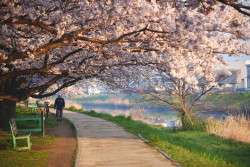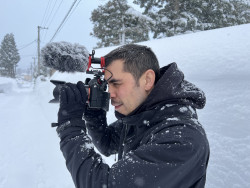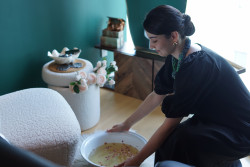
June 2, 2020
Pasocom Music Club Interview: Finding Creativity in Limitation
A millennial take on 90s synthesizer sounds
By Takahiro Kanazawa and Jessie Carbutt
In 2015, Aoi Shibata and Masato Nishiyama went to a secondhand shop together with a ¥10,000 note in their pocket and bought themselves the best they could afford with it: cheap, second hand synthesizers from the 90s. Thus, the journey of the analog synthesizer duo Pasocom Music Club had begun. Fast-forward to 2020 and the duo has transformed the synthesizer music landscape in Japan beyond the legacy of Yellow Magic Orchestra. They released two albums, DREAM WALK, Night Flow and an EP, PARK CITY, from Maltine Records (described by Pitchfork as one of the top 10 important Japanese internet music labels in 2014), and were even commissioned to make the end-credits tune for Pokemon.
So what’s the hype about old synthesizers? These now-retro machines offer cheaper-quality sound compared to modern software synthesizers, and fewer sound settings, but it was precisely these limitations that sparked the the duo’s creativity and interest. “We are not necessarily obsessed with the oldness of the machines but we like the sounds they could offer,” explains Nishiyama. “For example, the preset sound of the guitar [of the old machines] feels nothing like a real guitar, unlike the more modern, advanced synthesizers. But that original, retro sound itself is still cool. Plus, for modern software synthesizers, there are too many things we can do. It’s hard to work with these, especially when you’re an indecisive person. Having only a few sound options can simplify what to do and help us focus how we can use them.”

The combination of this bulky, 90s equipment and two young, skinny guys in their 20s looks strangely aesthetic. In terms of the duo’s sound, although it might come across as nostalgic or a reminder of Japan’s electro trio Yellow Magic Orchestra, it still feels new and updated thanks to their millennial twists and the use of synthesizers — especially their favorites such as Roland’s TR-707 or YAMAHA’s MU-120. “If we use those synthesizers the way people did in the 90s our music would just sound exactly like the 90s,” adds Nishiyama.
The second album Night Flow, is a cocktail of ambient, pop and 90s vibes and includes the song “hikari” — a collaboration with fellow Japanese artist Hakushi Hasegawa. DREAM WALK, meanwhile, was a debut collection of the duo’s early works from SoundCloud — the platform where Shibata and Nishiyama started out sharing their tunes with each other.
Soon after this SoundCloud account launched, Pasocom Music Club’s popularity began to grow and the two were invited to perform at a lot of events. “We were really surprised because we were just making music for ourselves. While performing in Tokyo and our home town Osaka, we learned a lot about the music scene, which helped us establish our music style,” Nishiyama continues.
Metropolis: Did you grow up listening to electronic music?
Aoi Shibata: Yes, I used to listen to Yellow Music Orchestra. Lately, while staying home, I’ve been listening to Japanese ambient artist Hiroshi Yoshimura as his songs were just released on Spotify. If you listen to his music with the windows open, it feels like there are no boundaries anymore between the inside of my room and the outside.
Masato Nishiyama: I was following band music when I was younger, but the preset sound “Orchestral hit” in a song called “Owner Of A Lonely Heart,” by British progressive group YES, would probably be my first exposure to electronic music. Art of Noise, another electronic music group from the producer Trevor Charles Horn is my favorite too. During this quarantine time, I’m into soundtracks such as the American horror movie Us, released in 2019.
M: “Pokemon Shiritori” is one of the songs you perform often at shows and it stands out from a lot of your other work. How did you come to create a Pokemon theme song?
AS: One day, I was walking around my house and a guy from a production company I know suddenly called me asking if I knew Pokemon and if I’d be interested in producing the ending song for the anime series. I remember I was like “…that Pokemon?!” then called Nishiyama and we decided to do it.
MN: It was such an honor to work with Junichi Masuda, the music producer of the very first Pokemon series “Red and Green,” and the guy who made the song ”Pokemon Techno.” We wrote our techno-esque but kid-friendly song so that anyone can be familiar with it. We got a lot of comments from kids but even adults were singing along to this one in clubs when we performed. It was a really nice thing to see and we are so happy that this song belongs to everyone.
M: Alongside Pasocom Music Club, you guys have been writing songs for other artists. How does this experience contribute to your music career?
MN: Having side projects clarifies what Pasocom Music Club is for us. It enables us to pursue our own way, what we love and what we want to do.
AS: It’s really interesting to see how the audience perceives changes in our sound. We perform at various places such as festivals, live houses and clubs. Of course, we try to think of what the audience would like to see, but we also try to implement some musical elements we think the audience wouldn’t expect from us. For example, we often play straightforward techno music at festivals because the audience doesn’t consist of only our fans. It might be a contrarian approach, but I think we enjoy balancing our set between what the audience is familiar with and what is not and seeing people’s reactions to it.
M: What were the themes for the past two albums?
MN: Both albums are about extraordinary moments of daily life in different ways. DREAM WALK includes a lot of songs on SoundCould and the cover photo is a family restaurant in Atami. You can see the ocean and the horizon from the restaurant, and the view is pretty magical at night. I used to go to family restaurants for lunch when I was doing a normal job. Nothing is special about family restaurants. It’s just one of the places to go to in your daily life. We found it interesting to see such a magical view, which feels like a dream, from a place that’s not magical at all.
AS: Night Flow is about complex feelings people have during the night. We are from a rural part of Osaka and there was nothing to do at night. We were just looking up at the sky being introspective. When you go for a walk at night, music sounds much clearer than usual and you can feel fragile, emotionally uplifted and anxious all at the same time. I think we wanted to express those feelings in our sound. If DREAM WALK is about dreams as opposed to reality, Night Flow covers how cities look different at night and the impact of the change in our feelings.
M: As well as your sound, your visual content such as your website and videos engage with vaporwave culture.
AS: Yes, when we started Pasocom Music Club, vaporwave and future funk culture already existed. But we didn’t intend to sound like that or anything. However, we are interested in those cultures because the synthesizers we are using are popular among future funk songs, too. There’s lots to learn about how they edit nostalgic sounds in modern ways. It’s great that the fans of those cultures like our music.
MN: We made a lo-fi video “introduction movie” the other day. I remember high-resolution was becoming a huge thing a few years ago. It felt like pursuing better sounds and higher qualities was the right thing to do. However, I think those hi-fi things don’t necessarily mean they are better than anything else. We still love lo-fi sounds or poor quality images. The debate of quality shouldn’t define what is good or not, it should be personal preference. The introduction movie might have come out as the antithesis of this, but we made a 4K video for another song “reiji no machi.” We may be very contrarian. [Laughs]
M: How have you guys been spending your time lately? Online live streaming rapidly became popular during the coronavirus pandemic and your music style might not require venues to perform unlike band music. How important is it for you guys to perform in an offline world such as in live houses?
AS: We had many events booked in May and June and were supposed to perform with Hakushi Hasegawa in April. We are gutted about missing shows and not being able to perform, but we’re still moving forward and thinking about what we can do next.
MN: The experience of live streaming is very different from the normal gig experience. Not many people have the sound systems music venues have. Music venues also offer spontaneous encounters with other people. Online streaming services don’t have that role as a physical community-space. In my opinion, there is no point in debating which is better. Both have pros and cons so we should keep doing both, choosing the right way each time.







